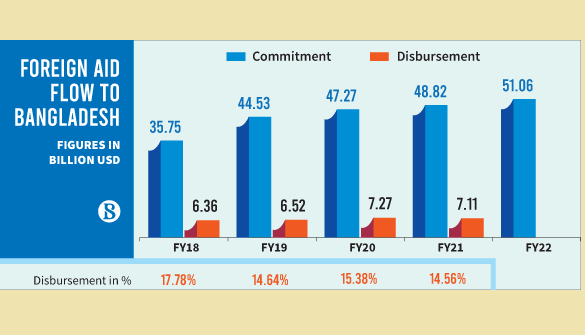The Khulna-Mongla rail line project was initiated with a $389 million loan promise from India. With a three-year deadline, construction began in 2010, but has remained unfinished in the past one decade due to land acquisition issues, late starting of the project by Indian contractor and changes in the railroad design in the middle of the work.
As such, the slow implementation could not use 40% of the loan as Bangladesh keeps paying for the unutilised portion of the amount.
Despite a more than $7 billion disbursement, the size of the foreign aid pipeline burgeoned to a record $51 billion in the recently concluded 2020-21 fiscal year, thanks to Covid pandemic-led crises, poor implementation capacity of the authorities and bureaucratic tangles of the financiers.
According to the latest report of the Economic Relations Division (ERD), the volume of the pipeline was $48.8 billion at the beginning of the 2020-21 fiscal year.
Only 14.5% of the foreign aid committed at the beginning of the last fiscal year was disbursed whereas economic experts think a minimum 20% disbursement will be deemed as good performance.
The authorities said aid commitments by development partners for the mega-projects were pouring in every year but the relevant ministries and divisions could not ramp up their capacity accordingly, resulting in many projects limping around for a decade.
Deadlines for development projects usually range from three to five years as delays in project recruitment, issues over land acquisition and tenders, frequent changes of project directors and delay in decision-making affect project implementation, officials noted.
On top of this, bureaucratic tangles of the development partners sometimes hold back prompt implementation as several phases of such projects require the nod of foreign financiers.
Projects without feasibility studies and assessments are also revised in the middle of the work, which eventually lead to deadlines and spending targets being missed.
In the FY 2020-21, virus-led movement curbs joined the list of project-delaying factors.
With international flights cancelled, foreign consultants and experts could not come to project sites, resulting in delays in the Padma Rail Link project, Karnaphuli tunnel, Dohazari-Ghundhum rail line, Matarbari coal-power plant, Rooppur Nuclear Power Plant and other development works with foreign funds.
"In the last couple of years, the government took up a number of mega-projects with foreign assistance. The foreign funds open up for project utilisation after the signing of the loan agreements, and the amounts for five-year projects have to be spent in one year. This has also contributed to the increase in the aid pipeline," said an ERD official preferring anonymity.
The official claimed the spending capacity of the ministries and divisions had improved substantially in recent years which helped disburse more than $7 billion last year.
Of the utilised amount last year, around $2 billion was budget assistance and had no link with project implementation. The ERD believes the utilisation of foreign aid could have been more if the pandemic did not get in its way last year.
Dr Ahsan H Mansur, executive director of Policy Research Institute (PRI), said the government needs to be more sincere about implementation alongside raking in aid commitments.
"We need to strengthen monitoring. If we can do that, the better utilisation of aid in the pipeline would also speed up the economy."
Zahid Hussain, a former lead economist of the World Bank Dhaka office, said many of the development partners had now switched to the fast-tracking method as country directors in some cases were empowered to deal with development financing.
"Due to the switchover, headquarters' nods are no longer needed," he added.
"In Bangladesh, there is a huge gap between aid commitments and disbursement. We need to overhaul project procurement and project management for quick disbursement from the pipeline," he noted.














